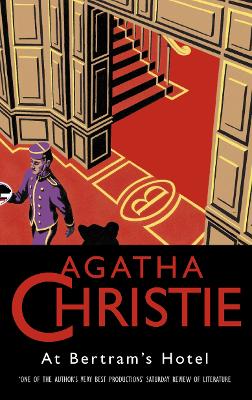Reviewed by brokentune on
I put a spoiler warning on this post not so much because I will discuss the details of the plot but because I will discuss some of the characters in a way that will give away much of the conclusion. If you are planning to read the book, don't read any further. You have been warned.
At Bertram's Hotel is one of Dame Agatha's less outrageous novels starring Miss Marple. There is not a lot of action in this story but there is a lot of interaction between the characters which eventually leads to the highlight of the plot. So, in a way this book starts at the end and works towards the crime. It certainly would not be a Marple story if there was no crime.
As mentioned, I will not go into the details of the plot and contain my observation to the following:
1. This was one of the best Marple stories I have read. The characters were detailed and life-like and Marple did not interfere too much with the goings on at Bertram's. The structure of the book was great in that it was a mystery, but not the usual who-dunnit. I.e. Christie delivered a story that was built on the mere suggestion that something was wrong, but the actual crime was a result of the interaction of the characters, whereas usually the crime precedes this.
2. I really don't like Miss Marple. Really. Can't stand her.
3. I'm still perplexed as to how Christie's books get away with some of the most patronising, misogynist, xenophobic, judgmental attitudes without getting much more flak for it.
So, here's my main problem: The characters are mostly stereotypical. This would be fine as I'm used to Dame Agatha's casting by now, but then you get the division between the British characters, the Americans, the Irish, and the rest of the world.
The British ones are all straight-laced, except for one or two, but even these are described and treated respectfully.
The American ones are described as curiosities and are slightly mocked for their being tourists in London and for being fascinated by the quaint English things around them.
The Irish one, a decorated veteran, is a lovable rogue but also a blackmailer.
And then there is the French-Polish-Italian racing driver, who is described as someone who looks like he is up to no good and undoubtedly will be trouble to all involved with him, even though there is little to evidence this. It is purely Miss Marple's impression that he is a most unsuitable young man.
Despite the stereotyping, Bertram's Hotel is full of fabulous characters. One of my favourites - and probably one of my favourite Christie characters - is Bess Sedgwick.
"Bess Sedgwick was a name that everyone in England knew. For over thirty years now, Bess Sedgwick had been reported by the Press as doing this or that outrageous or extraordinary thing. For a good part of the war she had been a member of the French Resistance, and was said to have six notches on her gun representing dead Germans. She had flown solo across the Atlantic years ago, had ridden on horseback across Europe, and fetched up at Lake Van. She had driven racing cars, had once saved two children from a burning house, had several marriages to her credit and discredit and was said to be second-best dressed woman in Europe. It was also said that she had successfully smuggled herself aboard a nuclear submarine on its test voyage..."
I rooted for Bess all the way through the book. So, reading the ending was a huge let down. Not only in the way the story ended but also in the way that Marple, or is it Christie, at one point described Bess a "nymphomaniac" even though she wrote to say that Marple would not call her that, but would call her a woman who "is too fond of men".
And the Miss Marple's counter-part, who is just as sanctimonious as Marple, describes Bess as "wild" and destined for ruin because she will not submit to society.
I was already raging at this point when Marple finished it off with this:
“Yes,” said Miss Marple. “The children of Lucifer are often beautiful—And as we know, they flourish like the green bay tree.”
Oh, get lost, Marple.
The part that eludes me is that Dame Agatha seemed to be rather progressive for her time. There were a lot of turns in her autobiography that I would not have expected. The last thing I expected was for Christie to describe a woman as "wild" just because she was fond of racing cars, sports, and adventures, because if this truly was Christie's attitude, then she herself was beyond redemption.
So, what I am taking forward to the next Christie book is that her characters may have standards and values that are consistent within the characters (and the social mores of the time) but are not necessarily consistent with the values of the author. I'm told that this is something that can happen.
Reading updates
- Started reading
- 20 September, 2015: Finished reading
- 20 September, 2015: Reviewed
